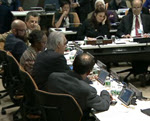| |
|
| |
|
| |
|
| |

Photo: UN Web TV
|
A side event on financing social protection floors (SPFs) was held on Monday 22 May, 2017, on the occasion of the Second Economic and Social Council (ECOSOC) Forum on financing for development follow-up (FfD forum) which took place at the UN in New York from 22 to 25 May 2017. The event was entitled “Financing social protection floors throughout economic cycles”, and was organized jointly by the Federal Ministry for Economic Cooperation and Development (Germany), the Permanent Mission of Argentina to the United Nations, the International Labour Organization (ILO), and Brot für die Welt and SocDevJustice on behalf of the Global Coalition for Social Protection Floors. By Gemma Adaba, SocDevJustice/GCSPF. Read more
| |
| |
|
| |
|
| |
The Association of Southeast Asian Nations (ASEAN) High Level Conference on Social Protection was held from 15 to 17 August 2017 in the Philippines.
Representatives from civil society, trade unions and people’s organisations in Southeast Asia jointly presented the statement to call on ASEAN leaders to take action on several demands and it also provides specific recommendations that require urgent action. The statement was endorsed by 28 national and regional organisations based in Southeast Asia. Read more
| |
| |
|
| |
|
| |

|
The IMF’s Independent Evaluation Office rarely lives up to its pretention to operate in real independence from the Fund, as its name implies, writes Peter Bavkis. One is hard-pressed to cite IEO reports that embrace thorough critiques of IMF policies, despite their frequency in academic circles and among civil society organisations, or that call for substantial revamping of policies and practices. The IEO report The IMF and Social Protection fits into this pattern.
However, by operating as a sounding board for IMF officials the 16-year-old IEO produces reports that often reveal useful information about Fund operations and staff attitudes. From that point of view, the report on social protection does not disappoint. Among other things, it provides a detailed account of the IMF’s hostility to concepts such as universal social protection.
Perhaps most surprising, for those who have not followed the IMF’s evolution in recent years, is the invitation to the Fund to question whether its endorsement in 2015 of the SDGs is compatible with its reaffirmed support for narrowly targeted safety nets. Read more
| |
| |
|
| |
|
| |
The report of the Independent Evaluation Office (IEO) of the IMF on the institution’s approach to social protection shows this is far from true. And it does not look as if human rights, universalism and redistribution are going to be part of the IMF-agenda soon.
Social protection has been on the international development agenda for about ten years. Strangely enough, it was the World Bank who first published a ‘theoretical framework’ in 2000, broadening but simultaneously eroding the traditional concept of social protection. It is easy to understand that if migration and child labour are recognized as mechanisms of families to avoid poverty – and therefore part of social protection -, there is a problem. As was made clear ten years later this report was a logical consequence of the poverty reduction policies the World Bank had been promoting since 1990 and which were the start of a new social paradigm. Read more
| |
| |
|
